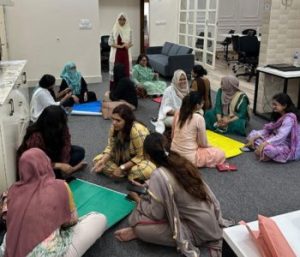The JCI Dhaka Founders, in partnership with NJ Eat And Fit, recently organized an informative session for working women delving into the complexities of the female body and its menstrual cycle. Headed by me, Nahray Jannat, this comprehensive discourse equipped women with the knowledge and tools essential for effectively managing their menstrual health hosted at Founders Hub.
Understanding the Menstruation Cycle
The session began with an in-depth explanation of the menstruation cycle, breaking it down into its fundamental parts. Participants gained a clear understanding of the biological processes that occur during each phase, from the follicular phase to ovulation and the luteal phase.
This segment provided crucial insights into the normal patterns of the cycle and highlighted the importance of recognizing any abnormalities.
Every Phase of the Menstrual Cycle
Each phase of the menstrual cycle brings its own set of changes and challenges. The session detailed the specifics of each phase, emphasizing hormonal fluctuations and their effects on the body.

This knowledge helped participants better understand their bodies and prepare for the physical and emotional changes they may experience.
1. Menstruation Phase (About 3 to 7 Days)
During menstruation, hormone levels decrease, which can lead to symptoms such as cramps, breast tenderness, irritability, and fatigue.
2. Follicular Phase (About 14 Days)
After menstruation, the follicular phase begins. Many women report feeling their best during this time, often experiencing increased energy levels.
3. Ovulation Phase (About 24 to 32 Hours)
Ovulation occurs around the midpoint of the cycle when certain hormones reach their peak levels. This can result in a heightened sex drive, though some women may also experience discomfort, breast tenderness, or bloating.
4. Luteal Phase (About 14 Days)
The luteal phase follows ovulation, lasting about two weeks. Sensitivity to fluctuating hormone levels can lead to various symptoms, including irritability, anxiety, breast soreness, bloating, or acne.
Nutrition and Training During Your Cycle
Nutrition plays a vital role in managing menstrual health, and the session provided detailed guidance on the best foods to eat during each phase of the menstrual cycle. From iron-rich foods during menstruation to nutrient-dense meals during ovulation, attendees learned how to tailor their diets to support their bodies’ needs and promote overall well-being.
Day 1-7: Menstruation |
Day 8-14: Follicular Phase |
Ovulation (Approx Day 15) |
Day 15-28: Early Luteal Phase |
Day 22-28: Late Luteal Phase |
|
Nutrition
|
Nutrition
|
Nutrition
|
Nutrition
|
Nutrition
|
|
Exercise
|
Exercise
|
Exercise
|
Exercise
|
Exercise
|
Mental and Physical Changes During Menstruation
The menstrual cycle can significantly impact a woman’s mental and physical health. This segment addressed the common mental and physical changes women experience, such as mood swings, bloating, and fatigue.
 By understanding these changes, participants gained valuable insights into managing their symptoms more effectively.
By understanding these changes, participants gained valuable insights into managing their symptoms more effectively.
Improving Fertility
For women looking to conceive, understanding the menstrual cycle is essential. The session provided tips and strategies to improve fertility, including lifestyle changes, dietary recommendations, and the importance of tracking ovulation. I shared valuable insights to help women enhance their chances of conception.
Self-Care Tips During Menstruation
Self-care is crucial during menstruation. The session provided practical self-care tips to help women feel their best during their period.
Prioritize sleep and rest: Ensure you get enough sleep and allow yourself to rest when needed.
Enjoy a nice hot chocolate: Treat yourself to a comforting drink.
Wear comfortable clothes: Choose soft, comfortable clothing to relax in.
Practice breathing exercises: Engage in deep breathing exercises to reduce stress and tension.
Write down your feelings: Journaling can help process emotions and provide mental clarity.
Enjoy a nice bubble bath: Take a warm, soothing bath to relax your muscles.
Have a pamper day: Indulge in self-care activities like skincare routines and other pampering treatments.
Watch your favorite movies: Relax with your favorite films or TV shows.
Do light stretches: Gentle stretching can help relieve tension and improve circulation.
 Coping with Depression Due to Menstruation
Coping with Depression Due to Menstruation
Depression and mood swings can be a challenging aspect of menstruation. The session offered coping mechanisms and support strategies to manage depression related to the menstrual cycle. By addressing the mental health aspect, participants found ways to maintain emotional balance and well-being.
Suitable Exercises During the Menstrual Phase
Exercise can be beneficial during menstruation, but it’s essential to know what types of exercises are suitable. The session covered gentle and effective exercises that can be performed during the menstrual phase, helping to reduce symptoms and improve overall health.
You can follow my YouTube channel for a suitable exercise: https://www.youtube.com/@NJEatAndFit
15-Minute Freehand Exercise Session
To wrap up the session, participants engaged in a 15-minute freehand exercise session. This activity boosted well-being, promoted physical fitness, and demonstrated practical exercises that can be incorporated into daily routines.
Conclusion
The JCI Well-being Session on Menses and Female Health by me (Nahray Jannat) was an invaluable opportunity for women to understand their menstrual health better. By addressing various aspects of the menstrual cycle, nutrition, mental and physical changes, and self-care, this session empowered women with the knowledge and tools needed to manage their menstrual health effectively. The event successfully enhanced the well-being of its participants and fostered a supportive community of women.



